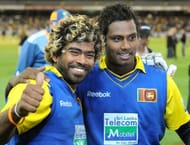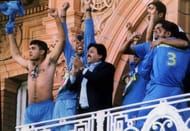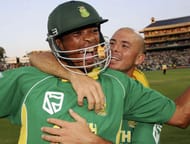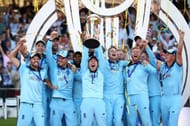On 5 January 1971, Australia and England competed in the first ever One Day International (ODI) cricket match at the Melbourne Cricket Ground and in the space of over 48 years, there have been 4192 ODI matches, 12 World Cups and six different World Champions.
The ODI format is arguably the most popular format of the game and over the years this format has presented some nail-biting finishes, remarkable individual performances and some truly astonishing victories against the odds.
To pick the top ten greatest ODI matches of all-time is a herculean task and there will be debates over the inclusion or exclusion of a particular match. However, based on the scenario of the game and its importance, we’ve compiled a top ten list.
#10. Sri Lanka vs Australia - 1st ODI at Melbourne (3 Nov 2010)

Prior to the 2010/11 Ashes series, Australia, who were the three-time defending world champions, hosted Sri Lanka in a three-match ODI series. In the first match at the MCG, the hosts won the toss and chose to bat first but they could only set the Sri Lankans a target of 240.
The visitors got off to a poor start and lost both their openers with only 19 runs on the board. Kumar Sangakkara and Mahela Jayawardene added 54 runs for the third wicket before the latter was dismissed. By the time Sri Lanka huffed and puffed to 107, they had lost eight wickets with Lasith Malinga joining Angelo Mathews in the middle.
It looked like the Aussies were cruising towards victory but what followed was one of the biggest rescue acts in cricket history. Mathews and Malinga added a record 132 runs for the ninth wicket with the tailender scoring 56 runs off only 48 balls. Malinga was run out when the Lankans needed one run to win but the last batsman, Muttiah Muralitharan hit a boundary to seal the win.
Mathews, who was only 23 years old at that time, scored a brilliant 77 off only 84 balls under pressure and was adjudged the man of the match.
Also read - World cup all-time records
#9. India vs Sri Lanka - 1st ODI at Rajkot (15 Dec 2009)

This is yet another ODI in which Sri Lanka were the visiting team and had to chase. They won the toss and chose to field first and were blown away by the Indian batsmen. The home side scored 414 runs with Virender Sehwag scoring 146 runs off only 102 balls. It was the Men in Blue’s highest ODI total at that time and was surely enough to seal a comfortable victory or was it?
The Lankans came out all guns blazing. A century from Tillakaratne Dilshan and blistering half-centuries from Kumar Sangakkara and Upul Tharanga helped them reach 316 for the loss of only two wickets.
At the end of the 37th over, Sri Lanka needed only 89 runs from 78 balls, they had eight wickets to spare and in the middle were Dilshan and the hard-hitting Sanath Jayasuriya. However, in the next four overs, they scored only 21 runs and lost the wickets of Dilshan, Jayasuriya and Mahela Jayawardene.
Angelo Mathews and Thilina Kandamby batted well in the next seven overs which left them with only 15 to get off 12 balls. However, in the penultimate over bowled by Zaheer Khan, Kandamby and Thilan Samaraweera were run out and only four runs were scored.
In the final over bowled by Ashish Nehra, the Lankans could only score seven runs and Mathews was also dismissed in the fourth ball while trying to go for a biggie.
Also read - Best bowling figures in world cup
#8. New Zealand vs Australia - Pool Match, ICC Cricket World Cup at Auckland (28 Feb 2015)

Unlike most of the matches on this list, this match did not go down to the wire but it had some fantastic individual performances and several twists and turns along the way.
The two co-hosts and eventual finalists of the 2015 ICC Cricket World Cup played a pool match at Auckland and the Aussies chose to bat first after winning the toss. However, they were bowled out for only 151 with Trent Boult picking up 5/27 in his ten overs.
The Kiwis hit the ground running when they came out to bat and raced to 78/1 in only 7.3 overs with Brendon McCullum scoring 50 off just 24 balls. Pat Cummins dismissed the New Zealand captain in the eighth over but they still only needed 73 runs from 42 overs with Kane Williamson and Ross Taylor in the middle. Walk in the park, right? Well, think again.
Mitchell Starc bowled the ninth over and in the first two balls of the over, he uprooted the stumps of Taylor and Grant Elliott to give the Aussies a glimmer of hope. However, Williamson and Corey Anderson added 52 runs for the fifth wicket to swing the momentum back in their favour.
With 30 overs to go, New Zealand needed only 15 runs but in the next two overs, Cummins and Starc dismissed Luke Ronchi and Daniel Vettori respectively to put a shadow of doubt in the minds of the New Zealand fans.
In the 23rd over with only six runs left to win, Starc bowled both Adam Milne and Tim Southee. Trent Boult, the last batsman, had to face the rampant Starc and he survived the last two balls of the over.
Williamson, who was on strike in the next over from Cummins, hit a six off the very first ball to win the game without giving Starc an opportunity to bowl his final over.
You can watch the highlights of the match here.
Also read - Highest batting average in world cup
#7. India vs England - Final, NatWest Series at Lord’s (13 Jul 2002)

The 2002 NatWest Series was a tri-series involving the hosts England, India and Sri Lanka. After playing six games each in the league stage, India and England played the final at Lord’s.
In the final, England set India a target of 326 runs thanks to centuries from Marcus Trescothick and Nasser Hussain. India started their chase well and reached 106 in only 14.2 overs with captain Sourav Ganguly scoring a blistering half-century. However, they were soon reduced to 5/146.
At the crease were the young Yuvraj Singh and Mohammad Kaif and the duo added 121 runs for the sixth wicket before Yuvraj was dismissed. India still needed 59 runs off 50 balls which was reduced to 12 runs off 15 balls after a 47-run partnership for the seventh wicket between Kaif and Harbhajan Singh.
Kaif scored nine runs in the 49th over which left India only two runs short of the target but Zaheer Khan was on strike for the final over. Khan scored those two runs in the third ball of the over to give India a famous victory and it also sparked an iconic celebration from the Indian captain.
Also read - Most catches in world cup
#6. New Zealand vs Australia - 3rd ODI at Hamilton (20 Feb 2007)

The Aussies have been involved in some fantastic ODI matches which is why they feature more number of times than any other team in this Top 10 list. The match in question is the third and final ODI of the Chappell-Hadlee Trophy after the Kiwis had already won the series.
Australia were without many of their key players for the tournament but they were determined to win the final match to save some face. After winning the toss, they chose to bat and scored 346 runs with Matthew Hayden scoring an unbeaten 181 off only 166 balls.
New Zealand’s chase got off to a terrible start as they were reduced to 4/41 after 9.1 overs. A quick half-century from Peter Fulton got them to 116/5 leaving Craig McMillan and Brendon McCullum in the middle.
McMillan scored the then fastest century by a Kiwi player by reaching triple figures in only 67 balls. He went on to score 117 runs which is his highest individual score and the innings involved 13 fours and five sixes. However, when he was dismissed, the home side still needed 66 runs off 52 balls with four wickets left.
Australia tightened the screw by dismissing two tail-enders cheaply but a timely cameo from Mark Gillespie who scored 28 runs from 15 balls meant that in the final over, New Zealand needed seven runs. McCullum hit a six off the first ball to level the score before winning the game with a boundary with three balls and one wicket left.
Also read - World cup tied matches
#5. Australia vs West Indies - 5th Match, B & H World Series at Sydney (1 Jan 1996)

Michael Bevan is considered one of the best if not the best finisher in ODI cricket and arguably his greatest ever performance was against the West Indies in the fifth match of the Benson and Hedges World Series.
After winning the toss, West Indies chose to bat and scored only 173 runs from 43 overs in a rain-curtailed game. While most batsmen struggled to score, Carl Hooper scored an unbeaten 93 off only 96 balls for the visitors.
Australia's chase went horribly wrong and they were down to 6/38 at one stage. Bevan with some support from Ian Healy and Paul Reiffel got the chase back on track. In the final over, with two wickets remaining, Australia needed seven runs and Shane Warne was on strike.
A dot ball, a wide, a run-out, two singles and another dot ball reduced the equation to four runs needed off the final ball with Bevan on strike. In the final ball, he hit Roger Harper for a four down the ground to take his personal score to 78 off only 88 balls and seal a memorable win.
Also read - Most ducks in world cup
#4. Pakistan vs India - Final, Austral-Asia Cup at Sharjah (18 April 1986)

The Austral-Asia Cup was an ODI tournament held in Sharjah featuring the major cricketing nations of Asia and Australia. The inaugural edition was in 1986 and India and Pakistan faced off in the final.
Batting first, India set a target of 246 thanks to half-centuries from Kris Srikkanth, Sunil Gavaskar and Dilip Vengsarkar.
While chasing, Pakistan were reduced to 3/61 but a century from Javed Miandad and contributions from Saleem Malik and Abdul Qadir took them close to the target. However, they lost wickets at regular intervals and were down to 9/241 with Miandad still in the middle.
In the final ball off the game, Pakistan needed four runs to win and Miandad hit a low full toss from Chetan Sharma for a six over the mid-wicket boundary to give his team their most memorable win over their arch-rivals.
Miandad’s final score was 116 off 114 balls and he hit three fours and sixes each in his match-winning knock.
Also read - Most centuries in world cup
#3. Australia vs South Africa - Semi-Final, ICC Cricket World Cup at Edgbaston (17 June 1999)

It was the second semifinal of the 1999 ICC Cricket World Cup and South Africa won the toss and opted to field first. Australia could only score 213 before they were bowled out but South Africa still had a tough job on a bowler-friendly track.
The Proteas were reduced to 4/61 at one point but recovered to 6/175 after Jacques Kallis and Jonty Rhodes scored 53 and 43 runs respectively. However, they still needed 39 runs from 31 balls.
In the final over, South Africa needed nine runs and Lance Klusener, who was the eventual player of the series, was on strike having already scored 23 runs off only 12 balls. Klusener scored boundaries off the first two balls from Damien Fleming to level the score and in the third ball, Australia nearly ran out Allan Donald at the non-striker's end as he was backing up too far.
In the fourth ball, Klusener’s mishit shot went to midwicket and although there were two balls remaining, he called for a risky run. Donald at the other end was watching the ball and did not see his partner or hear the call for the run. By the time Donald started running, Klusener was at the bowler’s end and Australia pulled off an easy run out at the striker's end.
Although the scores were tied, Australia progressed to the final because they had beaten South Africa in the Super Six stage. In that match, Australia chased a target of 272 with two balls to spare courtesy of a century from Steve Waugh.
However, Herschelle Gibbs was guilty of dropping Waugh when he was on 53. Gibbs had the ball in his hands but in his haste to celebrate, he dropped the ball. Talk about fine margins.
You can watch the highlights of the match here.
Also read - Most catches in world cup year wise
#2. South Africa vs Australia - 5th ODI at Johannesburg (12 March 2006)

This was the fifth match of a five-match ODI series and it was also the series decider. Australia won the toss and batted first. They became the first team ever to score more than 400 runs in an ODI match and captain Ricky Ponting led from the front by scoring 164 runs off only 105 balls.
Australia ended their innings with 434 runs on the board and broke the previous best score by a team which had lasted for a decade. However, little did they know that their record would be broken in only a matter of hours.
South Africa started their chase poorly and lost their opener Boeta Dippenaar with only three runs on the board. However, Graeme Smith and Herschelle Gibbs put on a 187-run partnership for the second wicket in only 127 balls and after Smith’s dismissal, Gibbs went berserk.
For the third wicket, Gibbs and AB de Villiers scored 94 runs out of which Gibbs scored 77 off only 33 balls. When Gibbs departed after scoring 175 runs in only 111 balls, South Africa needed 136 runs from 109 balls. However, Jacques Kallis and Justin Kemp were dismissed after plodding innings and the hosts needed 80 runs from 47 balls.
When it looked like the match was slipping from South Africa’s gasp, Johan van der Wath scored 35 off only 18 balls to give Mark Boucher some support. In the final over, South Africa needed seven runs. Despite losing Andrew Hall in the third ball, Boucher hit a four in the fifth ball to complete his half-century and seal a record-breaking chase for his side.
Also read - Most sixes in world cup
#1. England vs New Zealand - Final, ICC Cricket World Cup at Lord's (14 July 2019)

Was there any doubt about the number one spot? It was not only the drama of the match but also the gravity of the situation that makes this match the greatest ODI of all time.
New Zealand and England had the opportunity to win their maiden World Cup and the Kiwis won the toss and elected to bat first. They scored 241 runs in their 50 overs but defending a low total against the might of the English batting was going to be a tough task.
England lost Jason Roy, Jonny Bairstow, Joe Root and captain Eoin Morgan with only 86 runs on the board and nearly 27 overs left to play. New Zealand had the upper hand but Ben Stokes and Jos Buttler put on a 110-run partnership for the fifth wicket to swing the game in England’s favour.
Stoke was still going strong but wickets fell around him. In the penultimate over of the match, Stokes tried to hit a six over midwicket only to find Trent Boult, however, before he could relay the ball to Martin Guptill, he stepped on the boundary line to concede a six. However, in the final over, England still needed 15 runs.
Stokes did not take a run off the first two balls to keep the strike and hit a six off the third ball. In the fourth ball, he hit a full toss to deep midwicket and called for two but Guptill’s throw deflected off a diving Stokes’ bat and went to the boundary.
England needed three off the last two balls and tried to get two runs off each ball only for the non-striker to be run out on both occasions which resulted in a tied match. The game had to be decided in a super over but both teams scored 15 runs each and as a result, England were crowned World Champions because they scored more boundaries in the 50 overs.
The defeat was hard for the Kiwis to take and they must be ruing their luck. Interestingly, the man of the match, Ben Stokes, was born in New Zealand and moved to England at a young age because his father, a former Black Caps rugby player, was appointed head coach of Workington Town rugby league club.
After the game, five-time ICC Umpire of the Year award winner, Simon Taufel revealed that the umpires made a mistake in awarding six runs to England for the overthrow off Stokes’ bat. Despite this, the 2019 ICC Cricket World Cup final will go down in history as the greatest ODI match of all time.
Also read - Most matches played in world cup by a player
Brand-new app in a brand-new avatar! Download CricRocket for fast cricket scores, rocket flicks, super notifications and much more! 🚀☄️
